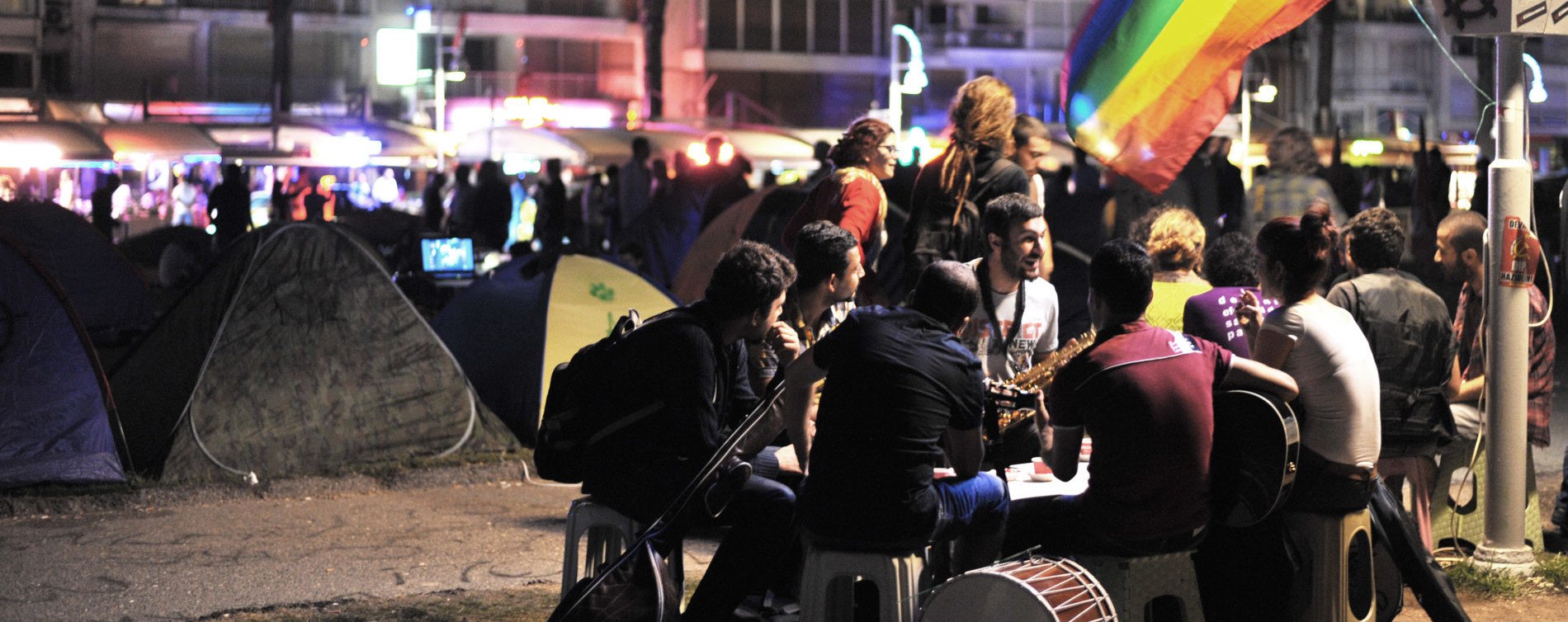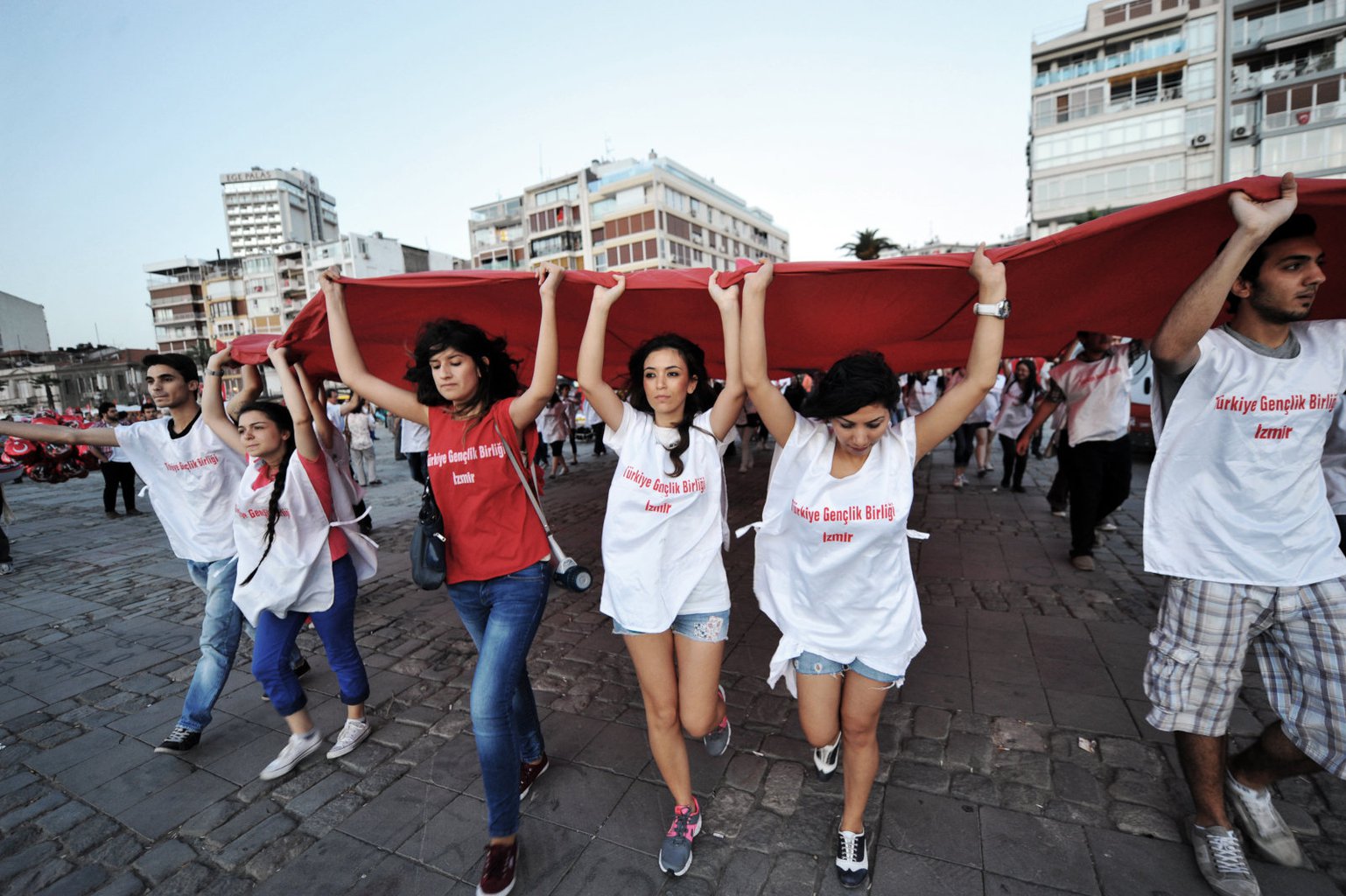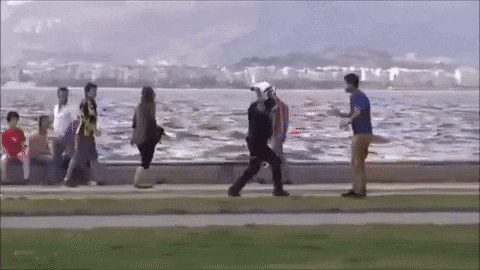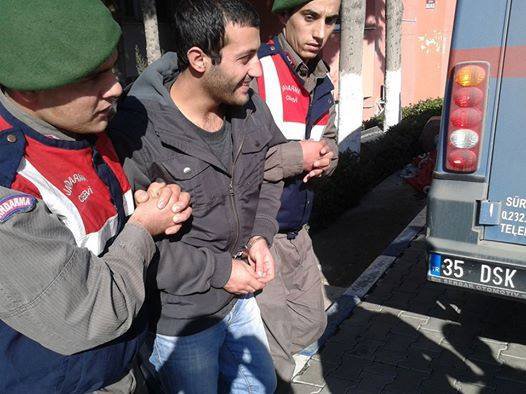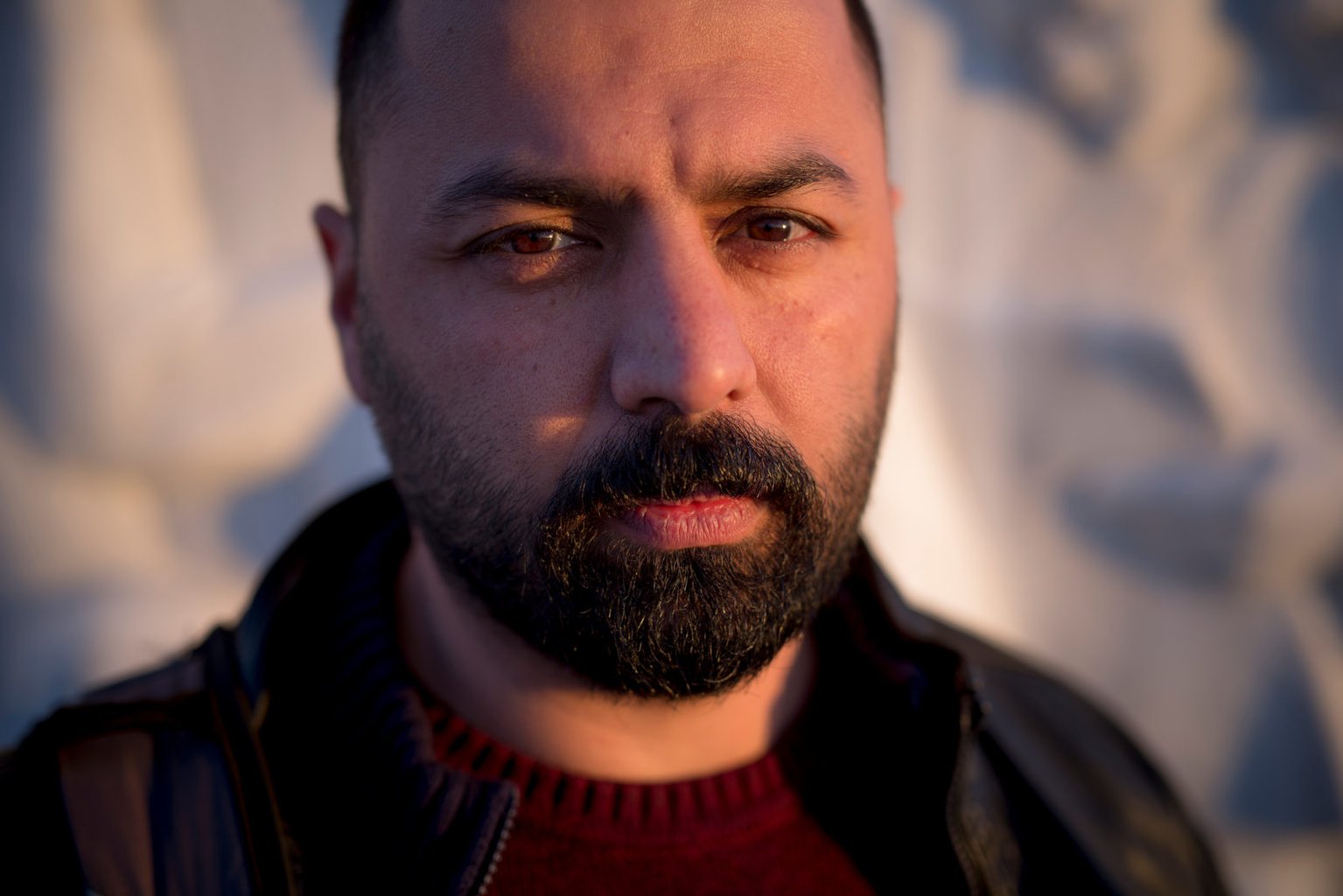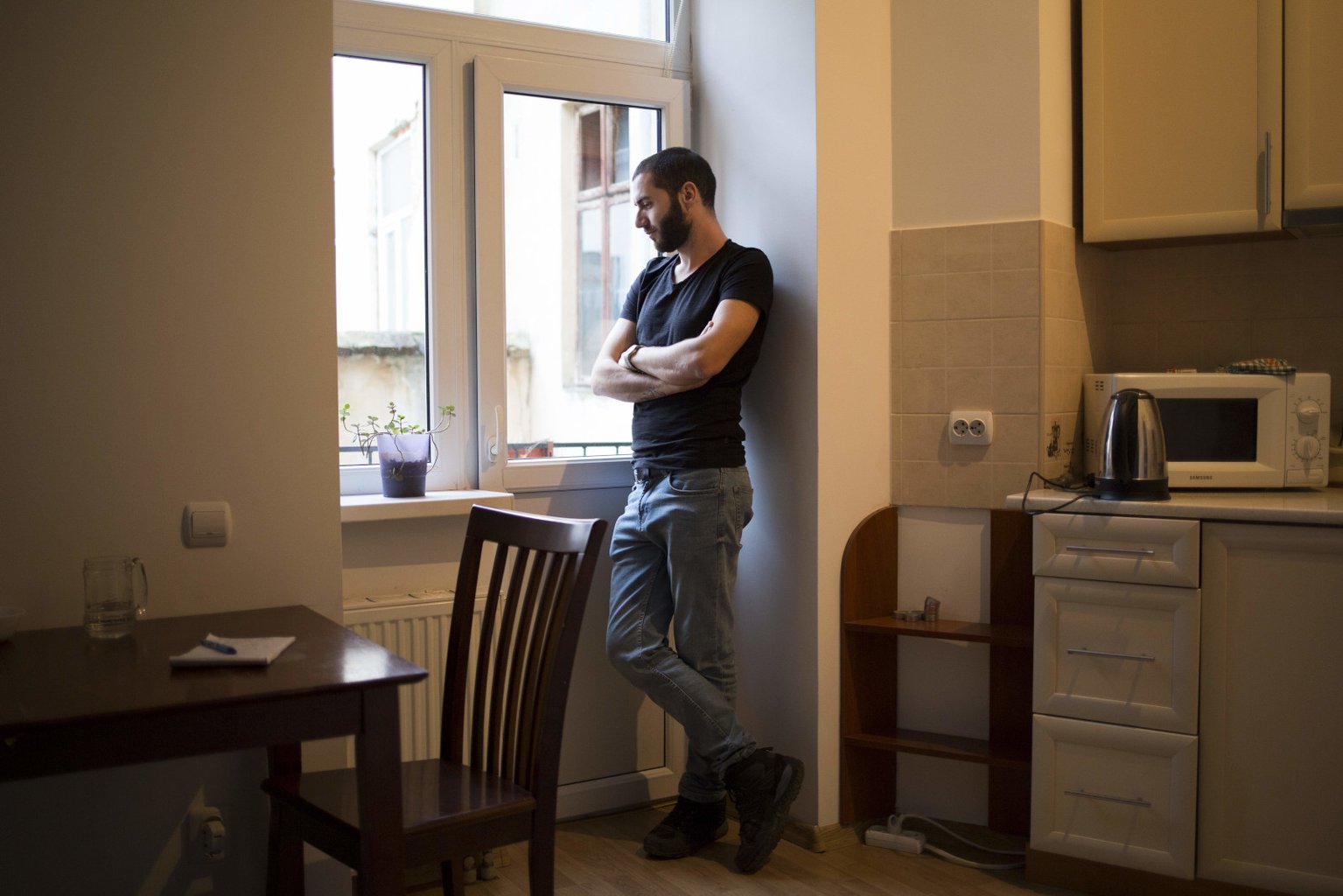The police conducted the dawn raids in an unusually polite fashion. On 5 July 2013, armed, plain-clothes cops gathered around a dozen apartments, houses and workplaces across İzmir, a province on the western coast of Turkey with a population of just over four million.
At 6am, they rang the doorbells.
Over the next few hours, police searched homes and arrested suspects, charging many with terrorism crimes.
The 5 July operation was the third wave of arrests by İzmir police in as many weeks.
Those taken on that day, and others, were not members of violent political or religious groups. They were mostly students and young people who had joined mass anti-government demonstrations, known as the Gezi Park protests, which had taken place across Turkey throughout June.
Hundreds of once-hopeful demonstrators became terrorists overnight. By the time the İzmir operation was over, more than 50 people from the region were arrested and charged.
Among those accused of terrorism were four friends: three students from a local university, and a 30 year old factory worker, all active in local politics.
On Sunday, Turkey has its fifth election in four years, and its significance is huge. Should Erdoğan and his party emerge as winners, which seems likely, he will complete a decade-long project to create one man rule in Turkey.
The momentous vote, which Erdoğan brought forward by 18 months, falls almost exactly five years since the end of the Gezi protests in late June 2013.
The remnants of Gezi linger. Today, three of the friends from İzmir await final sentencing on Gezi-related terrorism charges, in a trial one calls a “witch-hunt”.
But the case against the men was facilitated by a prosecutor who now also finds himself behind bars, as one of Erdoğan’s enemies.
The Black Sea obtained documents and interviewed those connected with the case, which reveal how Turkey’s resistance became targets of overzealous prosecutors and judges, who in turn were jailed, by a system that operates as an extension of Erdoğan’s will.
2013 Protests: Brought Down by Beatings, Torture, Killing
The Gezi park protests, which began in May 2013, were the first public threat to Erdoğan’s rule. For years, he and his Justice and Development Party (AKP), popular among conservative and Islamist Turks, had been accused of trampling on civil liberties and being too friendly to corporate interests.
At that time, the government announced it would demolish the small, barely green Gezi Park in Istanbul’s popular Taksim Square to make way for a shopping mall. On the first day of construction - 27 May - a few dozen environmentally minded Istanbulites launched a sit-in, and were determined to stop the diggers.
The atmosphere was mostly relaxed. The police watched and waited.
The state’s tolerance did not last. Police were ordered to disperse the crowd, attacking protesters with pepper spray, tear gas and batons.
Erdoğan, calling the demonstrators “looters”, approved of the violence.
The police brutality sparked mass demonstrations across Turkey. Millions gathered in almost every major city, protesting not only the violence but Erdoğan’s and the AKP’s interference in public life, which had included attempts to ban kissing in public and the sale of alcohol.
With the Middle East still shaken by the Arab Spring, Erdoğan was worried he might follow the fate of Egyptian President Hosni Mubarak, or even Gaddafi. The Government crackdown became more severe.
Thousands were injured from overexposure to tear gas or from police firing rubber bullets and tear gas canisters at their heads. Detainees were beaten or tortured. When it was all over a few weeks later, police had killed at least ten people. One officer died after falling from a bridge.
Five hundred kilometres away from Gezi Park, in İzmir, a western peninsular city known for its liberal lifestyle, university friends Orhan Yildiz, Görüş Atici, Yasin Sünger, as well as a fourth man, were eager to join what they saw as the ‘resistance’ - a mixture of #Occupy and the Arab Spring.
Yasin, Görüş and the third friend were in their early twenties and studying at Dokuz Eylül University (Ninth September University) in İzmir. Orhan, older than the others, was 30 years old at the time and a factory worker.
The group bonded over Marxist politics and, when Gezi kicked off, they were already politically progressive, participating in human and workers’ rights demonstrations and moves to convince local factory workers to unionise.
This was something, Orhan confessed, he was “always getting fired for”.
Yasin, a humorous, calm and soft-spoken 28 year old Political Administration graduate, told The Black Sea: “I always tried to be part of the political struggle in Turkey. With Gezi, the whole nation was out in the streets and I would never have been able to sit at home or go to sleep knowing it was going on [without me]”.
He said that the small İzmir gatherings in those first few days consisted of the same few people “who always go on the street to protest against anything”. They would meet and march on the local AKP offices, shouting slogans.
Then something else occurred.
“I was expecting the movement to end very fast,” Orhan said. “It wasn’t like that. It became so big.”
On 2 June, this gang of young İzmir students and union members were joined by tens of thousands of people - and millions more across Turkey - marching in solidarity to the Gezi cause and against Erdoğan’s government.
Every day in İzmir at around 6pm masses of demonstrators assembled at Gündoğdu Square at Kordonboyu, a popular promenade of bars and restaurants along the shore.
“There were so many women, young people. It was incredible,” Orhan told The Black Sea. Protesters put up tents and began singing and dancing, planting vegetables and trading goods. “They were happy times,” he added.
As each day ended, police ordered the crowds to disburse. They refused. The scene turned ugly.
Orhan, seemingly the most political of the group, who speaks calmly, but with clear conviction, described the police conduct as severe. “Everything was very peaceful, but the police were very brutal from the beginning.” For several weeks in June, the cycle of protest followed by nighttime clashes continued.
“We all thought Erdoğan might resign. But then he stepped up the violence and started killing people.”
The police and its mob supporters murdered ten protesters around the country.
This bloodshed, as well as nightly beatings, sapped the energy of the demonstrators. People started staying at home. All over Turkey, the crowds got smaller.
“There were thousands at the protests. Will you jail everybody?”
After the crisis of Gezi, the government, under a rattled Erdoğan, began restructuring the state to prevent it from happening again. New laws granted the police extra powers to inflict violence and monitor citizens.
Prosecutors had already begun issuing arrest warrants. In cities like Istanbul, İzmir and the capital Ankara, cops rounded up anyone present at the demonstrations, identifying them from CCTV and undercover police footage.
Mostly they targeted those they considered troublemakers who were involved in local political causes. In İzmir, with its leftist and anti-government populace, whom Erdoğan once called “gavur”, an offensive term with a similar meaning to ‘kafir’ or infidel, the desire to clamp down was strong.
Şule Arslan Hizal, an attorney from the Progressive Lawyers’ Association (CHD), an Ankara-based legal group devoted to human rights and Kurdish issues, told the Black Sea: “Erdogan gave the order to go after the protesters when he realised it wasn’t calming down. This was especially intense in İzmir.”
As each week passed, Yasin, Orhan and Görüş saw friends arrested. When the police finally came, none of them was surprised.
“There is no official record of this, but the police told my lawyers that they took people they knew,” Görüş told The Black Sea. “They didn’t find me on CCTV, they just knew I attended protests before. It was a witch-hunt.”
This fear was backed up by the cops. The guys were first taken to a police station in central İzmir, where they were denied access to lawyers. “The people arrested were known for their political activities,” Orhan said. “I even said to a police chief, ‘There were thousands of people at the protests. Are you going to jail everybody?’
“He answered: ‘No, we’ll jail you.’”
Hizal said that the police arrested around five hundred people during the protests, but almost immediately let all of them go.
People like Görüş, Yasin and Orhan, admitted Marxists with a taste for public disobedience, were “selected,” she added. “They were known to the police. They hand-picked the socialist boys that they knew from before.”
Days later they were led into the 12th Heavy Criminal Court of İzmir and formally arrested.
“They charged us through a ridiculous law,” Görüş said, “number 2911, which is acting against gathering, public meetings and marching. They also charged me with resisting police orders, damaging public property and membership of a terror organisation.”
This last charge was ambitious, even for the enthusiastic prosecutor, Ender Karadeniz.
“Karadeniz argued that we were members of the Marxist-Leninist Armed Propaganda Unit,” Orhan said, referring to a Turkish leftist organisation which carried out a handful of assassinations more than 30 years ago. “This organisation is from the 1970s! They don’t exist anymore.”
The three friends’ lawyers confronted Karadeniz, who relented. “He knew he couldn’t prove membership of a terror organisation which doesn’t exist,” Görüş said. “They switched to an alternative charge they like to use, which is ‘committing crime on behalf of terror organisations without being members.’”
This is a law rarely seen anywhere else, if at all. Over the past decade, and especially since the failed coup attempt, in July 2016, Erdoğan and the Turkish Justice Ministry have regularly fallen back on this charge to prosecute opposition elements - including a number of journalists - who they think of as terrorists, but cannot prove it.
“The sentence,” Görüş added, “is almost the same as being a terrorist. The difference is they don’t need evidence.”
After the arrests were formalised, Görüş, Yasin and Orhan were sent to İzmir’s Kırıklar F-type Prison, a high security facility on the outskirts of the city, which houses both murderers and political prisoners, and assigned a three-person cell together. The fourth friend, not named in this article to protect his identity, did not join them. He cooperated with the police.
“We prefer not to talk about him,” Görüş told us.
While the gang awaited the prosecutor’s indictment, they adapted to their new life as prisoners. Surprisingly, this was not difficult.
Among the prisoners housed on the same block as them were fellow university colleagues and activists jailed for alleged Gezi crimes. “I was put in jail with my housemate and friends from university. So there was no difference in my life!” laughed Görüş.
“It was actually good for my personal development,” said Yasin, who grew up in Antalya, a popular tourist city on the south coast. “The prison guards did not take us very seriously. I read so many books and played chess. The library was rich and the librarian was a good person.”
“I say this and people get mad,” laughed Görüş, “but I recommend jail time as part of personal growth. People should see what’s happening inside. We were in a political wing and the fellow prisoners would send us notes and food. They advised us to use our time well, but always imagine we were going to be released tomorrow.”
Prosecutors are obliged to produce their evidence within one month, according to Turkish law. Under the state of emergency, this hardly ever happens, especially in political cases. It is considered rude to apply pressure on them.
Although well-stocked with reading material and friends, it would take three months for Karadeniz to issue his indictment and the trial to get moving. When it began, it was clear the evidence was questionable.
The 26-page document, written by Karadeniz and obtained by The Black Sea, shows little, if any, evidence of wrongdoing by the defendants, who were accused of acting “in accordance with the orders of leftist terror organisations.”
Much of the file is devoted to definitions of terrorism and the history of the defunct leftist terrorist group. The rest, outlining the specific evidence against the friends, borders on incompetence.
“Karadeniz had me at every protest in the İzmir province,” Görüş said. “I was in three places at once, often 50 km apart.”
The obvious inconsistencies were not the only troubling aspect. It was clear from the document that the İzmir police had been surveilling protests in İzmir long before Gezi, and Karadeniz was using some of that undercover footage against the defendants.
Police had also been tapping Orhan’s phone and had recorded innocuous conversations, details of which were submitted as evidence. So too was the forensic analysis from the phones, CDs, flash disks, SD cards, and “leftist publications” confiscated during the arrests, which, Karadeniz admitted, did “not to contain any criminal elements”.
The First Trial: ‘Marxist-Leninist Terror Cell’ Allegation
The trial began in September and the trio, represented by CHD, pleaded not guilty.
At the first hearing, Karadeniz submitted his evidence to the court and argued why it proved the men were responsible for very serious crimes. Like the indictment, the evidence didn’t amount to much. It didn’t need to.
One focus of the prosecutor was an attempt to identify the trio through blurry CCTV footage, from which Karadeniz blithely made connections. He showed a photo, taken by an undercover police officer, of Yasin wearing a burgundy t-shirt, walking though İzmir in the daytime. He then cut to footage taken in the evening of a masked man wearing a similar dark shirt throwing stones at the police. This was Yasin, he said.
A similar ‘video’ was used against Görüş and Orhan.
All three deny the damaging footage is of them. Even the prosecution’s own experts – which included the pro-government National Crime Bureau and the official Medical Forensics department – stated this footage was inconclusive.
Karadeniz also submitted into evidence a SMS text message from Orhan to a friend which said, “I took a short video of some protestors being detained last night, I’ll send it to you soon”. He argued this proved Orhan was aiming “probably to service it to organisation-related websites”, meaning the Marxist-Leninist terror group.
Over the next five months, there would be two further hearings where the prosecution attempted to convince the three judges – Turkish courts don’t have jury trials – that they were dealing with men in league with Marxist terrorism.
At the third hearing, in late February, 2014, the judges released them on bail. They had spent eight months in jail.
But they were not yet free.
Gezi Trial: Prosecutor, Defence and Judges Arrested in Purge
The judicial process in Turkey is sluggish. Trial dates are set months apart and take years to complete. In political cases especially, defendants are denied bail for long periods, which the European Court of Human Rights has concluded is an example of arbitrary detention.
The proceedings continued. Görüş and Yasin, who had passed their university exams in prison, returned to complete their studies. Orhan went back to work.
The Turkish judiciary and police were at this time locked in a political war with themselves. The cause was a spate of arrests on corruption charges of politicians from Erdoğan’s party engineered by prosecutors loyal to the secretive, political-Islamist sect of Turkish preacher Fethullah Gülen, long exiled in the U.S.
This so-called ‘17/25 December Corruption Scandal’ even hit Erdoğan, as leaked audio recordings of wiretaps implicated him and his family in taking bribes.
The leader’s response was to ‘cleanse’ the judiciary, police and the rest of the state, as he hastened plans to reshape Turkey as an executive presidency. Judges, prosecutors, lawyers, teachers and journalists accused of fealty to Gülen were fired and arrested en masse.
The conflict burned on until July 2016, when a small gang of army officers launched a failed coup against Erdoğan. Gülen was blamed - albeit not completely without justification - and Erdoğan’s purges went into overdrive.
After the coup, the leader passed emergency powers, which saw the arrest and jailing of the prosecutor Ender Karadeniz and some judges from the trial, including the one who originally ordered their arrests - who remain detained on terrorism charges. Also targeted were the trio’s lawyers - the CHD. The state shut down their association last year. The reason: terrorism.
All the while, the trial against Görüş, Yasin and Orhan, now at the 2nd Heavy Criminal Court inched forward with new judges and a new prosecutor. Landing in the ‘2nd’ court was a stroke of bad luck- the judges there were tough and more ruthless than the others.
It was the summer of 2017 before there was a meaningful breakthrough in the proceedings: The judges invited the defendants’ lawyers to present a closing argument before they delivered a verdict.
“The lawyers thought they could use this opportunity to present a full defence once again,” Görüş told The Black Sea. “This worked.”
The judges retired to consider the defence. Two weeks later, they found Görüş, Organ and Yasin guilty of taking part in illegal demonstrations and fighting with police, sentencing them to time served and five years of probation. The terrorism charges were dropped. This time they were free.
So they thought.
The verdict was not unusual. Across Turkey, many who faced charges stemming from their Gezi action - real and imagined - were largely dealt with in the same way. Courts acquitted or found them guilty of lesser charges and handed out suspended or light sentences. It was a compromise. The conviction rate was high, and the state made its point.
What was not usual was that the Karadeniz’s replacement refused to settle. The decision by the judges against the İzmir three was not unanimous and the prosecutor issued an appeal stating that, with their release, terrorists were now on to Turkey’s streets.
The case went to the Bölge Adliye Mahkemesi, the new ‘District Courts’. This process was quicker. At the end of October, the district court judges revoked the acquittals, determining that the trio should be punished for each crime separately, including those of terrorism: The sentence was six years and three months.
The Flight: “I may never see Turkey again”
The reversal of the earlier judgement by the district court meant a final showdown in the Court of Appeal, which would likely take up to a year. The lawyers were not optimistic.
Anticipating a guilty verdict, Görüş and Yasin fled Turkey.
Orhan stayed. Speaking with The Black Sea, he appeared calm at the prospect of returning to jail for half a decade, and admits that his bonds to Turkey are too strong to cut.
“I love this country and the thought of never returning is horrible,” he said. “Instead of trying to learn to adapt somewhere else for several years, I'd rather do time and leave the prison and continue my life in Turkey.”
Orhan feels Turkey will survive beyond Erdoğan. “I'm no more worried about my future than millions of others in this country,” he added. “It seems more logical to me to stay and continue the struggle for a better future.”
Yasin left İzmir immediately after the announcement, and tried to escape from Turkey to Greece across the Maritsa river.
“On my first attempt, I was alone and my dinghy was torn so I had to swim back,” he said. “The next day, I got another guy to help and we crossed into Greece.”
The Greek border police told him he had ten days to claim asylum or leave the country in six months. “I went to the asylum office [on time], but they always said they were busy,” said Yasin. “It was chaos there and eventually I gave up.”
In Athens, he settled into a commune occupied by Greek anarchists, who provided shelter to six other Turks. The exiles spent the day hanging out, talking and surviving.
“I am broke here and I was broke in İzmir,” he said.
Two weeks ago, just before the six-month deadline, he applied for asylum. The Greek authorities gave him a date for his first asylum interview: It is in 2021.
“I assume they think I’ll leave the country by then,” he said. Although his new status allows him work, there are few jobs in Athens or the rest of the country, still reeling from financial meltdown.
Nevertheless, he added: “Athens is such a beautiful city. So much like İzmir and Antalya.
“I miss Turkey terribly. I miss it more because I do not know what’s going to happen. What makes me so upset is the possibility that I might never see it again.”
Görüş fled to Ukraine.
For two months, Görüş walked the streets of the eastern city of Lviv, blending in among the Ukrainian families and a few foreign tourists.
Elegant, educated and easy-smiling, he is unlikely to ever have been taken for a political refugee. So Görüş spent time between Rynok Square, where students gather on benches to drink and play music, and studying English in a nearby small studio flat he rented on the first floor of an old building.
To the locals, Görüş was probably just another Turkish holidaying in Ukraine, which is close, cheap and visa-free. But Lviv is just 70 kilometers from the border with Poland, where the European Union begins.
This was why Görüş picked Lviv - a base to smuggle himself into the EU.
This was no so easy. Those offering help wanted a lot of money - and to be paid in advance.
“How can I risk that?” he told The Black Sea during a meeting in Lviv. “If I pay 2,000 Euro or more to one of these guys and I fail I’ll be stuck here and in a worst situation then before.”
On a Saturday night in April, inspired by two Turks he met who had crossed the border, Görüş made his way to Poland. He was excited at the idea and confident of success.
It failed.
Today, Görüş is back in Çeşme, a seaside town in İzmir popular with tourists and refugees. He works at a bar, flirting with vacationing girls, and collecting good tips.
He told The Black Sea that the Polish border police seized him crossing the border. He immediately requested political asylum, and offered his court papers as proof of persecution. The police said no.
“I told them I wanted asylum and a lawyer and the Polish rejected both requests,” Görüş said. “I told them about international law and the Dublin agreement. They didn’t care.”
When asked about the incident, The Polish Border Guard told The Black Sea it complies with international law.
Görüş was sent to the Turkish Embassy in Kyiv, and after a few days was deported to Turkey.
Now Görüş and his lawyers are waiting for the final verdict from the appeals court: “We are expecting jail. Our foresight is limited and nothing is certain. I do not know what is going to happen.”
A few days ago, he proudly sent a photo of his Bachelor’s Diploma in Economics and said: “I just managed to pick it up yesterday. Doesn’t it look cool?”
Sunday’s election will likely install Erdoğan as Turkey’s absolute ruler, despite a strong showing by the opposition in the last two months. But Turkey is in crisis. Presiding over a tired and embattled country with a failing currency and dwindling financial resources, Erdoğan has inspired the opposition, who attack his lead in the polls.
“The government cannot forget about Gezi,” Görüş told The Black Sea. “It's their unhealed wound. They saw people could rise up for what they wanted. The people saw what they were capable of.”
Opening picture: Tents occupy the Kordonboyu promenade in İzmir, Turkey, June 2013 (Copyright: Ozan Kose: AFP via Guliver)
